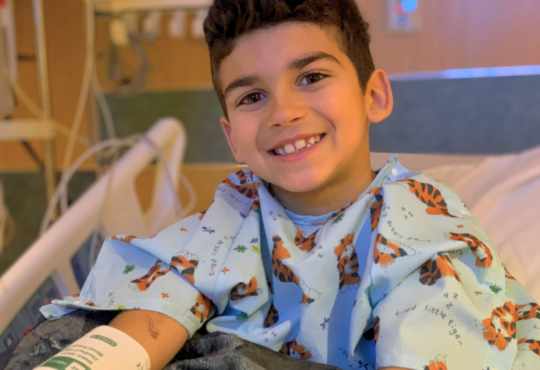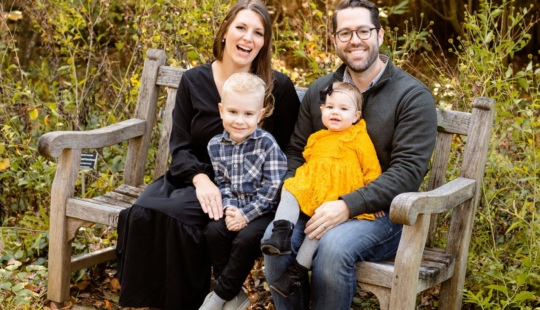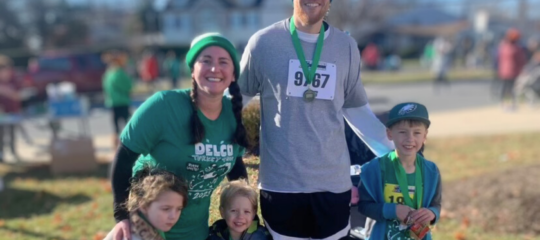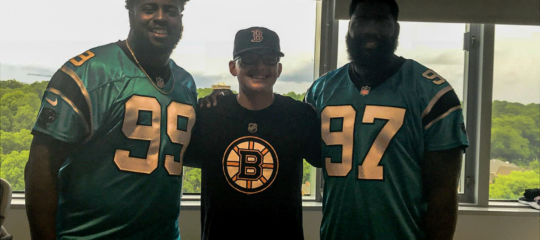
Advocating for Graham: It Takes a Family, a Village, and a Little Help from PBTF

It’s been a year and a half since Graham, who is four, was diagnosed with a pilocytic astrocytoma, a low-grade, slow-growing brain tumor. It was Christmas Day 2022. Starting earlier that December, Graham, who had always been a good eater, became very picky. His mom, Abbie, was concerned enough about this change that she contacted Graham’s pediatrician, who reassured her this was likely just normal toddler behavior. With the holidays rapidly approaching, Abbie and the doctor agreed Graham would come in for an appointment after the holidays. A week later, the family headed from their home in Chapel Hill, NC, to Washington, DC, for Christmas.
“On Christmas morning Graham was super lethargic. He didn’t want to wake up, which we assumed was due to the long day of travel the day before. But then he had no interest in opening presents. All he wanted to do was nap.”
After allowing Graham to sleep another three hours, Abbie became concerned and awakened the toddler.
“When he woke up, he couldn’t walk,” Abbie says. “My husband, Andrew, immediately picked Graham up, and said, ‘Get your keys, we’re going to the ER’.”
At the hospital all of Graham’s bloodwork came back normal. “They were about to send us home,” says Abbie, “but my husband said we weren’t leaving until they did a head scan.” This was the start of Abbie’s and Andrew’s advocacy on behalf of their son.
A CT scan revealed a five centimeter tumor in the middle of Graham’s brain. Two days later Graham underwent surgery that removed 40% of the tumor.
Since then, Graham has undergone intensive therapy to relearn how to walk, talk, and eat. Through it all, he has tackled each challenge with unwavering determination and a good dose of humor. (Graham is a sucker for just about any knock-knock joke.)
Abbie shares that one of the biggest challenges has been struggling with standing up and making her voice heard when communicating with medical professionals and their health insurance provider. “I struggled with being confident enough to advocate for Graham when I knew the provider wasn’t working out,” says Abbie. “But then I realized I could vocalize my concerns and make a change.”
They’ve also become more comfortable accepting offers of help. A few months into Graham’s treatment, overwhelmed by the challenges and recognizing the need for support, Abbie turned to the Pediatric Brain Tumor Foundation, having heard about the extensive resources offered by the foundation from other parents of brain cancer patients.
“I think the biggest thing for me was [PBTF’s] Starfolio Resource Notebook. It helped me think of questions I wanted to ask the doctors that I hadn’t thought about yet,” Abbie says. “It was really helpful and gave me language when I was struggling to talk to others.” The Starfolio Resource Notebook is a guide created by medical experts that helps newly diagnosed families stay informed and organized during their child’s treatment, a time when many families feel overwhelmed by so much new information.
Today, they have built a community of friends and members of their church who they are able to turn to for help whenever they can. “We refer to some of [our friends from the church] as the pseudo-grandmas,” explains Abbie with a smile. “They will come over and just step in like I would expect my mom to; they have been a life saver.”
As Graham’s journey continues, Abbie and Andrew continue to advocate for Graham’s and their family’s needs, including appropriate medical care, insurance coverage, and both physical and emotional support. And with Graham’s tumor showing signs of growth again in October, this responsibility has become more pressing than ever.
If you or a family you know needs the resources and support essential to being an informed advocate, the Pediatric Brain Tumor Foundation is here. Visit curethekids.org/support-for-families for a wealth of helpful information and community support for every stage of a family’s journey – from diagnosis, through treatment, and beyond. You can also connect with our Patient Family Advocacy team by completing this brief form or emailing [email protected] anytime.
Related Stories


A Dad’s Advice Regarding Help: Say Yes to Everything!

Brayson’s Incredible Journey: From Brain Tumor Survivor to NFL Equipment Manager and Mentor
Related Updates
Pediatric Brain Tumor Foundation Expands its Support for Families with the Addition of Scott Kennedy
Getting families where they need to be without worrying about the cost of transportation.
Pediatric Brain Tumor Foundation and Uber Partner to Provide Travel Credits for Families Navigating Challenges of Pediatric Brain Tumor Diagnosis
The Pediatric Brain Tumor Foundation (PBTF) and Uber are joining forces to provide essential support for families navigating the challenges of pediatric brain tumors.

